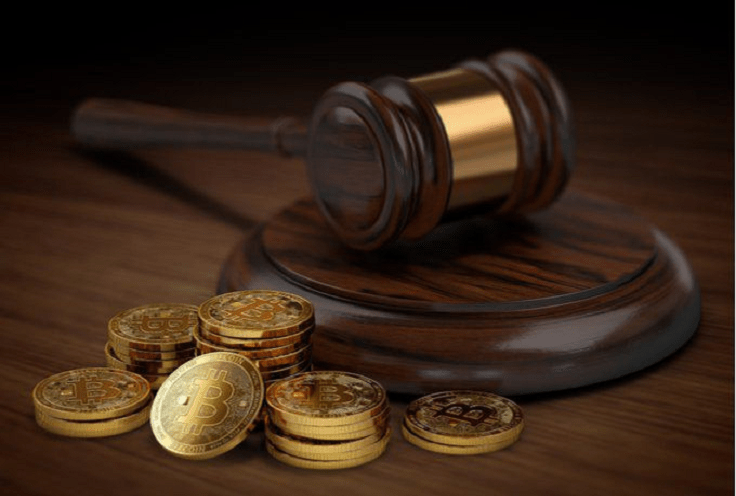Ever since the Silk Road, Bitcoin’s power to fuel anonymous transactions (and, more specifically, money laundering) has been a prime concern for lawmakers and law enforcement agencies. A new provision passed as part of the infrastructure package tried to tackle that issue, but it’s running into stiff opposition from cryptocurrency groups — and a legal challenge that could have huge implications for financial transparency across the country.
New tax code
In November 2021, when President Biden’s trillion-dollar Infrastructure Investment and Jobs Act was signed into law, a controversial cryptocurrency-related provision was passed along with the major legislation on roads, bridges, and other infrastructure.
The bipartisan infrastructure bill included an amendment to the tax code that required any business or individual receiving a cryptocurrency transaction of more than $10,000 to report it to the IRS, using a specific form that includes the sender’s name, date of birth, and taxpayer identification number. This matches the cash reporting requirements already in Title 26 Section 6050I, and failure to comply can result in a fine of up to $250,000 for an individual and up to five years in prison.
Though the tax code changes have already been passed, the reporting requirement won’t start until the 2024 tax year begins — unless a challenge to the law prevents it from coming into effect.
Last week, Coin Center filed a legal challenge in the United States District Court for the Eastern District of Kentucky, naming as defendants Janet Yellen as a representative of the Treasury Department, IRS commissioner Charles Rettig, and US attorney general Merrick Garland on behalf of the government as a whole.
A blog post from the advocacy group
It says that the legal complaint aims to overturn “unconstitutional financial surveillance.” The authors, Coin Center executive director Jerry Brito and research director Peter Van Valkenburgh, write:
Our suit leads with two major claims:
- (1) forcing ordinary people to collect highly intrusive information about other ordinary people, and report it to the government without a warrant, is unconstitutional under the Fourth Amendment; and
- (2) demanding that politically active organizations create and report lists of their donors’ names and identifying information to the government is unconstitutional under the First Amendment.
It’s clear from the legal complaint that the technical details of cryptocurrency are salient to the case. It’s easy to link transactions from the same cryptocurrency wallet address, the complaint argues, meaning that one reported transaction tied to a donor’s name and address could give a much more detailed and long-term insight into their financial history. (“From one 6050I report in 2024,” the text reads, “the government could discover that a person donated to a local mosque in 2016, paid for a son’s sobriety treatment in 2018, contributed to an unpopular political cause in 2020, and hired a marriage counselor in 2022.”)
However, some scholars of privacy and surveillance technology, like law professor Orin Kerr, labeled the arguments “not particularly serious”: in his opinion, the information in question was unlikely to be covered by the Fourth Amendment, Kerr tweeted, citing previous case law.
Where the First Amendment is concerned, the complaint argues that compelling an advocacy group to supply the government with details of donors giving more than $10K would create a “chilling effect” on the right to political expression. It’s an interpretation of the Constitution that has been upheld in some high-profile cases before, notably the landmark Citizens United ruling that removed electoral spending restrictions on corporations, unions, and nonprofits.
Section 6050I
On the other end of the spectrum, there are some crypto supporters who see the inclusion of cryptocurrency under section 6050I as entirely rational and have advocated for a more nuanced set of reporting mandates rather than a complete overturn.
If Coin Center’s challenge is successful, it could have implications far beyond cryptocurrency due to how the reporting law was passed in the first place.
When the new requirement was made law through the infrastructure bill, it wasn’t written as a new statute: rather, it was an amendment to an existing part of the US tax code — Section 6050I — that has been on the books for almost 40 years.
The 6050I rule states that any person who receives more than $10,000 in cash as part of a business transaction must provide details of the sender to the IRS through a particular form. This cash reporting requirement, which became law in 1984, came on the heels of the Bank Secrecy Act of 1970: one of the first major laws to address money laundering in the United States. Together, the new reporting laws passed in the ’70s and ’80s helped law enforcement agencies to detect and deter money laundering by creating requirements to file documentation that made it easier to track cash transfers and imposing penalties if such documents weren’t filed.
The law has been in effect ever since, without any significant change until now. In the infrastructure bill, a critical change of eight words was made to 6050I, expanding the definition of cash to include “any digital asset” and thereby extending the tax code’s reporting requirements to cryptocurrency. And because of this construction, a successful challenge on behalf of cryptocurrency users could mean overturning the statute completely.
Coin Center director, Jerry Brito:
“Given our cryptocurrency focus, our aim is [removing] the amendment that adds crypto to the 6050I cash reporting requirement,” Brito said. “But that said, if the entire 6050I has to go, that’s fine with us.”
Brito says that Coin Center doesn’t take a position on the concept of financial reporting overall — he points to the organization’s support for guidance issued by the Financial Crimes Enforcement Network (FinCEN) on how cryptocurrencies should be regulated under the Bank Secrecy Act — but other groups that have supported Coin Center’s complaint have a more ideological opposition to financial tracking.
One such group is libertarian think tank the Cato Institute: a blog post published by the DC-based research institute makes it clear that the fate of the legal challenge to section 6050I could serve as a bellwether for overturning other kinds of financial reporting.
Source: A LEGAL CHALLENGE OVER CRYPTO REPORTING COULD STRIKE DOWN DECADES-OLD ANTI-MONEY LAUNDERING LAWS.







